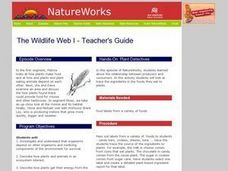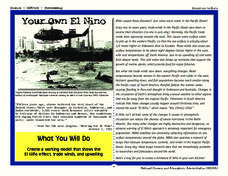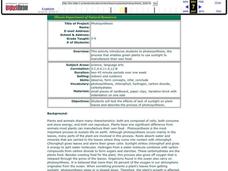Curated OER
The Wildlife Web I
Pupils explore the relationship between producers and consumers. In this activity, they trace the ingredients in the foods they eat to plants. Supplement to Natureworks episode from New Hampshire Public Television, but activities may be...
Curated OER
What's For Dinner?
Students explore the food chain. They brainstorm and create a consumer-consumed food chains using magazine pictures and research materials. Students identify consumer-consumed relationships.
Curated OER
Sea Connections
Young scholars, after locating different marine habitats on a globe, play a card game about ecosystems, food webs and organisms.
Curated OER
Collecting Compost
Students observe a composting box. In this soil lesson plan, students create a composting bin by using a bin, newspaper, worms, and food scraps. Students create a composting food web.
Curated OER
Health In Progress/ Soft Drinks
Students engage in a lesson that is concerned with the consumption of soft drinks by children. They examine the statistics about the consumption and determine the increase or decrease in individual servings consumed over time. They...
Curated OER
Hey, Mom! What's for Breakfast?
Students examine how he world eats breakfast. In this food choices instructional activity, students work in groups to list breakfast foods and their ingredients and find goods and consumers on the list. The, students use the Internet...
Curated OER
Let's Start Growing
Students investigate how a tree grows from a seed. In this plant biology lesson, students use potting soil, tree seeds, and a paper cup to observe seeds growing into plants. Students record observations in their science journals.
Curated OER
Bias Sampling
Students explore statistics by conducting a scientific study. In this data analysis lesson, students conduct a class poll about popular foods of their classmates. Students complete a worksheet and discuss how bias opinions affect the...
Curated OER
It's a Wrap!
Learners read about the importance of packaging foods and related items properly and reducing waste. In this packaging lesson, students read the background information about packaging and bring a variety of packaging materials to class....
Curated OER
The Giant Barrel Sponge
Students study barrel sponges. For this science and art lesson, students discuss what sponges are, create their own sponge, and share what they created with the rest of the class.
Curated OER
Animal Life Cycles
Students participate in numerous activities to gather information about parts of the life cycle. In this life science lesson, the teacher choose from a number of activities to create or support an interdisciplinary unit about the life...
Curated OER
Edible Plant Parts
Students participate in various activities to discover the six basic types of plants. In groups, they analzye the foods they eat and identify which part they consume. After reading "The Fablous Food Phantom", they create a food phantom...
Michigan State University
Friend or Foe?
What one person thinks is a pest may not be a pest to someone else. Here, scholars examine the characteristics of living things and pests through grand conversation and a variety of activities. Class members play a game of pest or not a...
NOAA
Your Own El Nino
Scholars make a model to discover how the force of trade winds over the Pacific Ocean creates an El Niño. Super scientists observe how the severe weather affects life in water and on land.
ARKive
Temperate Rainforest in the Pacific Northwest
Explore the amazing temperate rainforest of the Pacific Northwest. Your class starts by investigating the animals and plants of the Northwest, specifically Washington, and then research an animal population common to the area. In small...
Curated OER
Nutrition Lesson Plan
Third graders explore a variety of breakfast foods and beverages and write a creative story about their favorite. They then present their stories to the class and are encouraged to try different foods during the story time.
Curated OER
Seed Dispersal
Students explore seed dispersal by designing their own wind dispersed seed structure. Using one piece of paper and a box fan, they construct a seed dispersal structure, record the distance their seed travels, and answer discussion...
Curated OER
Photosynthesis
Students are introduced to the process of photosynthesis. In groups, they test the effects of the lack of sunlight on plant leaves and compare the results with their hypothesis. They note the characteristics that plants and animals share...
Curated OER
March Market
Students role play a living wetland food web. They trace the food web associated with the items in their lunch.
Curated OER
Worm Composting: Vermiculture
Students compost in a limited space and describe the decomposing process. Students convert unwanted, organic matter, particularly food scraps and paper into fertile soil.
Curated OER
WHY WE AREN'T FILTER FEEDERS
Students describe three methods of obtaining food: scavenging, filter feeding, and hunting. They describe three methods of obtaining food: scavenging, filter feeding, hunting, and list at least two reasons why humans are not considered...
Curated OER
Ecological Citizen
Students examine the interconnectedness of living and non-living things that constitute an ecosystem. They examine fallen trees,insects, living trees, leaves, food webs, and forests. They conduct various activities and write poems about...
Curated OER
All Wrapped Up
Learners work in teams to identify and sort types of packaging used in food production. They consider ways to reduce the environmental impact of packaging and reflect how consumer choices play a role in trash production.
Curated OER
My Farm Web
Third graders explore agriculture by viewing video clips in class. In this farm animal lesson, 3rd graders identify the animals mostly eaten that come from farms and the types of food they consume before they are eaten by us. Students...

























